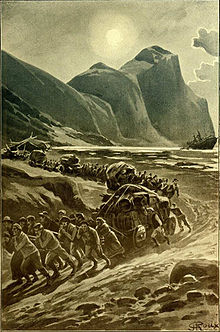The shipwrecked of the "Jonathan"

The castaways of the "Jonathan" (also Die Strandeten or Die Schiffwüchigen des Jonathan ) is a novel by the French author Jules Verne . The manuscript was written by Jules Verne between 1897 and 1898 under the working title En Magellanie . The novel was completed by Verne's son Michel Verne , who doubled the size of his father's manuscript. The French first edition appeared in France in 1909 under the title Les Naufragés du Jonathan in the Le Journal in Paris and then in book form by the Pierre-Jules Hetzel publishing house . The first German-language edition appeared in 1910 under the title Die Schiffbrüchigen des "Jonathan" by A. Hartleben . The English title of the novel is The Survivors of the 'Jonathan' .
Action based on the version by Michel Verne
On the lonely coast of the Strait of Magellan at the southern tip of South America lives the anarchist Kaw-Djer in stateless Magellania . This word from the language of the South American natives means something like: "friend, helper or savior". Kaw-Djer no longer feels a part of the established society. He lives with the Indian Karroly and his son Halg. Karroly works as a pilot between the wildly rugged islands of Tierra del Fuego . Kaw-Djer is an ideal person who has been disappointed by civilization and believes in anarchist maxims. His personal slogan is “No God, No Lord!” He lives a celibate life, devotes himself to the study of nature and does good among the natives. He benefits from his high level of education and medical knowledge. Over time he has earned a good reputation among the natives as a helper. The southerners, who live in harmony with nature and are organized in a relaxed tribal association, come closest to his lawless and irregular world of ideas. For this reason he had turned away from civilized Europe and sought solitude here. His personal idyll ends when Chile and Argentina agree on a division of Magellania between the two states. This means that the time of statelessness and irregularity is over. Kaw-Djer decides together with Karroly and his son Halg to move further south towards Cape Horn . Kaw-Djer loves Halg like a biological son and trains him with the help of his knowledge.
An apparently pilotless and rudderless ship is drifting towards the cliffs of Cape Horn. Kaw-Djer, Karroly and Halg have just come ashore from their sloop Wel-Kiej and are going back to sea to help the ship. They manage to strand the almost mastless ship on the island of Hoste . The people on board are saved. The 19-man crew (without the missing captain) and the 1179 passengers of the Jonathan, because that was the name of the ship, become extras of a social utopia.
The passengers wanted to settle in South Africa as colonists and were on their way with belongings, tools, portable barracks and food. Now they had to face the conditions on the island of Hoste. Conflicts develop. The opponents of Kaw-Djer are the French Beauval, an unsuccessful lawyer, demagogue and a self-overestimating propagandist who rambled about socialism without any practical relevance . The American Lewis Dorick, on the other hand, preaches pure, unadulterated communism . He takes the view: “Nothing belongs to anyone - and so everyone owns everything.” However, that does not prevent him from robbing the weaker colonists of the trouble of their work or of their food rations.
Kaw-Jer's life is entangled with the fate of the castaways. With the help of the sloop Wel-Kiej, contact is made with the Chilean authorities. Auxiliary troops and ships are expected to be deployed. However, Chile leaves the island of Hoste to the colonists in order to build a free republic and thus a colony. Beauval can be used as governor. From this point on, a lot goes wrong. In winter people die and freeze and starve. Contrary to his convictions, Kaw-Djer acts as governor of these people, after having been well received in the past with good advice and his medical experience. He is becoming more and more of a dictator as a "strong" hand is needed. In everyday practice, social conditions are considered. The attempt at collectivism is illustrated using this example. Kaw-Djer realizes that the management and organization of a group of people does not work without regulations and a fixed hierarchical order. He is not up to this challenge and fails. He withdraws to the lighthouse he built himself in front of Cape Horn. He hands over the "fate of the state" to the young man Dick with a farewell letter. In the letter he wrote to Dick: “Farewell! Always remember that there is only one humane goal: justice; one hatred: slavery; one love: freedom! ".
literature
- Heinrich Pleticha (ed.): Jules Verne manual . Deutscher Bücherbund / Bertelsmann, Stuttgart / Munich 1992.
- Volker Dehs , Ralf Junkerjürgen: Jules Verne . Voices and interpretations of his work. Fantastic Library Wetzlar, Wetzlar 2005.
- Volker Dehs: Jules Verne . Jules Verne. A critical biography. Artemis & Winkler, Düsseldorf 2005, ISBN 3-538-07208-6 .
Web links
- The castaways of the »Jonathan« as an e-book in HTML on zeno.org
- The shipwrecked Jonathan in Andreas Fehrmann's Jules Verne Collection